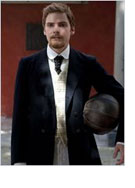

Opening 24 Feb 2011
Directed by:
Sebastian Grobler
Writing credits:
Philipp Roth, Johanna Stuttmann
Principal actors:
Daniel Brühl, Burghart Klaußner, Thomas Thieme, Jürgen Tonkel, Vincent Kastner
It’s 1874 in Germany and Wilhelm I is the emperor (Kaiser). Germany is a peaceful, united country. The population is divided into three classes of people: low, middle and high, with uneducated workers at the bottom and rich, educated industrialists and academics at the top. Schools are also divided into three classes with upper class students going to a Gymnasium which charges tuition, thus making it almost impossible for poorer children to attend without some kind of financial support. Teachers call students by their last names preceded by Herr (Mr.). Children speak to their parents in formal Sie form. A teacher is always right and children jump to attention when a teacher enters the classroom. Punctuality is important; discipline is harsh (corporal punishment, solitary confinement in a school room) and obedience is obligatory. The only school sport is gymnastics, e.g., on rings or parallel bars, definitely an individual, not a team, sport.
Into this setting comes English teacher Konrad Koch (Daniel Brühl). English is an experiment; so far students had only been confronted with dead languages. Koch observes the power of businessman Hartung (Justus von Dohnányi) to control all facets of school life both inside and outside the classroom. His son Felix leads the class in bullying and getting other students, specifically Joost – a poor factory worker’s child – into trouble. Koch also observes the difficulties students have with English – not only with pronouncing “th” but with accepting it as a subject since they have learned that England is inferior. He moves the lessons to the gym, throws out a leather ball which he brought back from England, and begins to teach them the game of soccer. They are excited; some apparent losers suddenly shine with athletic talent. Unfamiliar concepts such as teamwork and fair play seep into their consciousness, and they slowly become happier with themselves and each other. Only poor Felix suffers because he must answer to his strict father, who does not approve. Otto, another student, discovers that he is no longer the fat kid in the class, but one fine goal keeper, as well as having a terrific mind for business. He brilliantly convinces the foreman in his father’s factory to help him develop the manufacture of soccer balls.
Naturally, all does not progress so easily, and Herr Koch often has to take the blame for his students’ interest in this forbidden sport, as well as offer to resign to keep the peace. In this all-boys school, women play a small part, e.g., as mother or housemaid/rich-boy-love-interest. There is a heart-warming end, when a British team visits the school for a soccer match. Guess who wins?
This is based on a true story. Konrad Koch did introduce soccer at Martino-Katharineum Gymnasium in Braunschweig, Germany. In 1875 he published the first soccer rules in the German language. The first competitive game was against Göttingen in 1886. The first official soccer club (Verein) was organized in Braunschweig in 1885. Still, soccer was forbidden in most of Germany for which players could be expelled from school. After all, it brought people of all classes together, i.e., social equality: something totally unacceptable until 1927 when Bavaria finally caved in and succumbed to soccer fever, making it a national sport.
Director Sebastian Grobler had a great idea for his first film, especially since we will celebrate Konrad Koch’s 165th birthday on February 13, 2011. It’s perfect for the whole family, as even those who dislike soccer will appreciate the historical value from the fashions to the houses to the mannerisms. It might be too long for children under 12 years old; 105 minutes are not necessary as parts are repetitious. Watching innocent children being bullied by classmates or even teachers is not always fun – necessary to the plot, but sometimes sad to watch. This is a well-made educational movie, and I can imagine that whole classes of school kids will visit the cinema with their teachers – much like whole classes visit school museums to experience old-style learning. We will appreciate our modern education systems even more.
(Becky Tan)